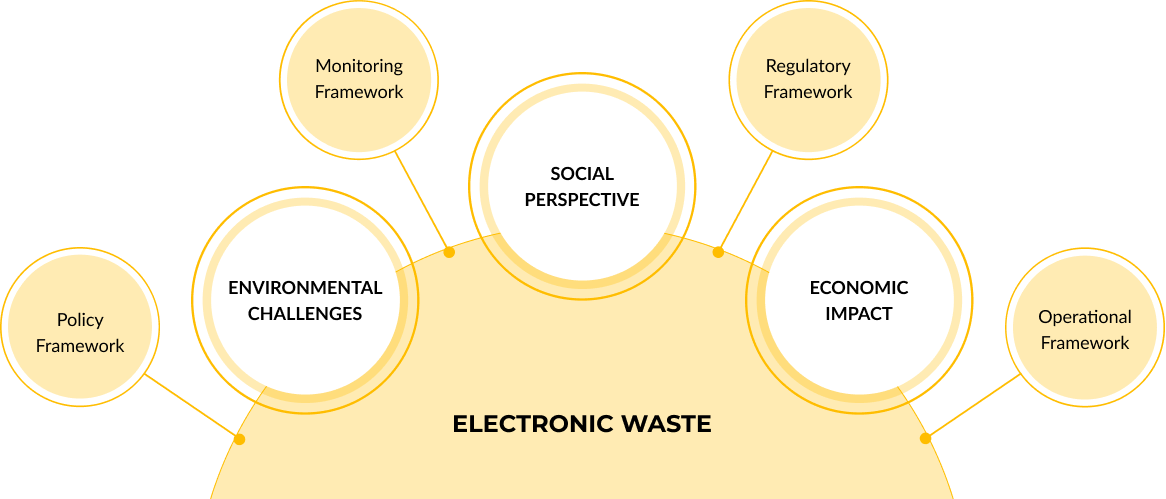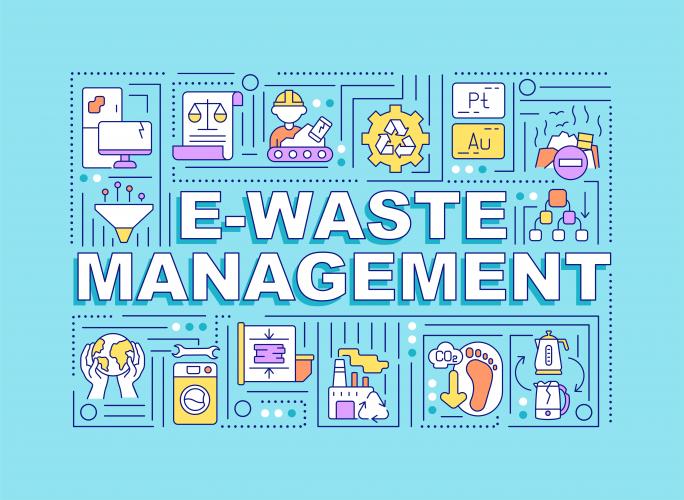
- A+
- A
- A-
Initiatives for E-Waste Management
Advances in electronics, communication, and information technologies, and increased consumers' affordability and have made Electrical and Electronic Equipment (EEE) indispensable. The waste arising from end-of-life electronic and electric products referred to as WEEE or simply e-waste is one of the fastest-growing waste streams in the world.
As per the Global e-waste monitor, 2020, India ranks third in e-waste generation after China and the USA. India is one of the fastest-growing markets for electronics in the world. The Electronics System Design & Manufacturing (ESDM) Industry Report, 2021 anticipates that the electronics industry in India will grow at a CAGR (Compound Annual Growth Rate) of 16.6%, from the US $215 billion in FY19 to the US $540 billion in FY25. This will further contribute to the ever-increasing volumes of e-waste.
The disposal of end-of-life EEE products has negative externalities in terms of impact on human health and the environment.
Sources
- https://ewastemonitor.info/gem-2020/
- https://ewastemonitor.info/gem-2020/
- https://indianexpress.com/article/india/31-6-rise-in-e-waste-generation-last-year-ashwini-choubey-to-rajya-sabha7424095/
- https://cpcb.nic.in/uploads/Projects/E-Waste/List_of_E-waste_Recycler.pdf
Deployment of indigenous and environmentally safe technologies at various stages for e-waste management will offer a unique opportunity for continuous access to critical materials, reduce carbon footprint, ensure self-reliance in producing various rare metals and fulfill the long-term aspirations for a circular economy.
A framework based on multipronged strategy

INITIATIVES
Policy Intervention
- An initiative on eco-friendly management of e-waste and circular economy has been taken up by the Office of PSA.
- A dedicated PM-STIAC meeting was organized on 'End-to-End E-Waste Management and Circular Economy' Chaired by PSA. All major stakeholders were represented in the meeting along with industry representatives.
Technology transfer support
- Technology webinars: The office has facilitated Technology webinars as a starting point toward having a collaboration mechanism in place. Several public R&D institutes and S&T clusters participated to showcase their technologies.
- Development of e-waste catalog on the I-STEM national web portal: This catalog has been created to serve as a common platform for all R&D efforts in the domain of "e-waste management". It aims to enhance collaboration between several players, while also avoiding duplication of research efforts. The catalog currently has technologies from CMET, NEERI, NML, and others. I-STEM reports
- Technology transfers, incubation, and collaboration: Facilitating engagement of technology developers like BARC, CMET, NML, CIPET, etc. with industry, to ensure that indigenous technologies get due attention of entrepreneurs.
On ground implementation
- Coordination with the Government of the National Capital Territory of Delhi (GNCTD) and other important stakeholders for the development of the e-waste management eco-park. The eco-park is in the early stages of development.
- O/o PSA and Smart City Mission are working together for mainstreaming of theconcept of e-waste management in the Smart Cities. A Stakeholder workshop on e-waste management in Smart Cities was organised on 10th May 2022. The outcomeof this workshop and several consultations with the experts is the advisory on e- waste management for the smart cities.





